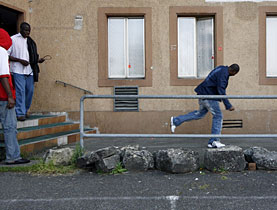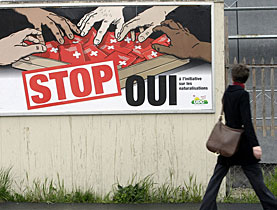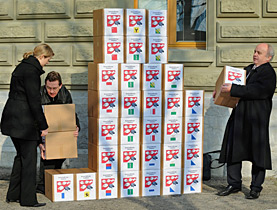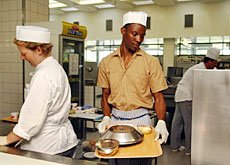Amnesty criticises treatment of asylum seekers

Approaching the 60th birthday of codified global human rights, Amnesty International has launched a characteristically fierce broadside against world leaders.
Switzerland fared better in the human rights organisation’s annual report than alphabetical neighbours Syria and Swaziland, but Amnesty again highlighted issues of racial discrimination and treatment of asylum seekers in the alpine nation.
“Injustice, inequality and impunity are the hallmarks of our world today,” Irene Khan, Amnesty International’s secretary- general, said on Wednesday. This year marks 60 years since the United Nations Convention on Human Rights came into force.
“2007 was characterised by the impotence of Western governments and the ambivalence or reluctance of emerging powers to tackle some of the world’s worst human rights crises,” she added.
Amnesty International has again demanded the United States close its Guantánamo detention camp and called on Chinese authorities to follow through on free speech guarantees.
“The most powerful must lead by example,” Khan said.
Regarding Switzerland, Amnesty was concerned by racism and cited a 2006 report by the UN special rapporteur on the subject, which concluded that the lack of a national policy on racism made it difficult to tackle the problem.
“Switzerland has no real action plan to combat racism and xenophobia,” Manon Schick, spokeswoman for Amnesty’s Swiss section, told swissinfo.
swissinfo contacted the Federal Migration Office and Federal Office against Racism but no one at either office was available for comment.
Amnesty has also taken aim at the high profile and controversial election campaign of the rightwing Swiss People’s Party last autumn, which featured a flock of white sheep kicking a black sheep off the Swiss flag.
“The reaction of other countries shows that they were very surprised that this could happen in Switzerland,” Schick said. She calls the scapegoating of migrants and asylum seekers a “very European problem”.
Cantonal differences
Amid complaints and questions from two UN special rapporteurs into the election matter, the government said it was reluctant to intervene, particularly in a political campaign. It pointed to the courts to weigh the balance between free speech and following international law.
Amnesty says this can be complicated in Switzerland. “It’s very difficult for the federal state to be sure that conventions are respected,” Schick said.
The country’s federalist structure places the responsibility on cantons – rather than the national government – to uphold obligations prescribed under international law.
Schick refers to the case of Samson Chukwu, a Nigerian who died in Swiss police custody in 2001 awaiting deportation. Although the authorities were exonerated, the UN Committee against Torture eventually recommended compensation for the family.
The only problem: Amnesty says the canton – in this case Valais – was not aware of the recommendation. Schick calls it “very problematic” that UN reports fail to reach cantonal authorities.
“It’s a big problem sometimes, but it’s also sometimes a big chance,” she said. Decentralisation can also result in faster adoption of new laws.
“We had the example of some cantons taking very progressive measures to combat domestic violence,” Schick said. The cantons of St Gallen and Neuchâtel were among the first to introduce measures to forcibly remove abusive men from their homes. Similar legislation was eventually adopted by other cantons.
“If we had waited for a federal decision, it would have taken a long time to get there,” she said.
Ethical code
Among other positive points for Switzerland, Amnesty mentions a move by the Lausanne city police department to adopt an ethical code, provide sensitivity training and recruit minorities.
“They are now ready to talk about human rights issues and I think this is very important even if they have not taken all the measures we were asking for,” Schick said.
Disputes between police and demonstrators – an issue the rights organisation has cited in the past – are now passed along to an independent investigator, something Amnesty has called for in the past.
“It shows that there is now a conscience, that they have to investigate these problems if they want to show that they really respect human rights,” she said.
swissinfo, Justin Häne
Torture or ill-treatment
At least 81 countries
Unfair trials
At least 54 countries
No free speech
At least 77 countries
Darfur
Zimbabwe
Gaza
Iraq
Myanmar
General secretary Irene Khan in 2005 called the US-run Guantánamo camp the “gulag of our time”. Apart from worldwide attention, the comment earned a rebuke from the White House.
The 2008 report accuses “impotent” and “ambivalent” governments of complicity in “injustice, inequality and impunity” and a failure “to tackle some of the world’s worst human rights cases”.
But the group noted “progress made over the last six decades, in particular laws and institutions on human rights, growing support for an end to the death penalty, prosecution of some cases of war crimes and crimes against humanity by international tribunals and national courts”.
Amnesty has demanded “immediate action” in response to serious rights violations but only recently voted to support the use of force – sanctioned by the UN – against unscrupulous regimes.

In compliance with the JTI standards
More: SWI swissinfo.ch certified by the Journalism Trust Initiative



You can find an overview of ongoing debates with our journalists here. Please join us!
If you want to start a conversation about a topic raised in this article or want to report factual errors, email us at english@swissinfo.ch.